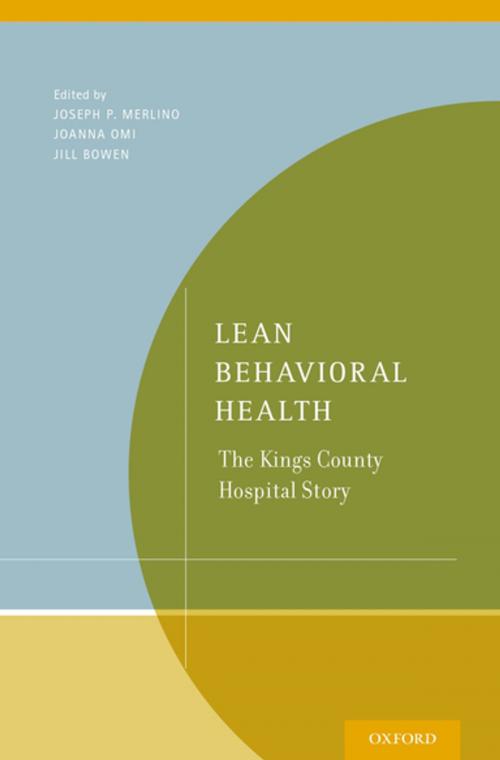Lean Behavioral Health
The Kings County Hospital Story
Nonfiction, Health & Well Being, Medical, Specialties, Psychiatry| Author: | ISBN: | 9780199989546 | |
| Publisher: | Oxford University Press | Publication: | January 8, 2014 |
| Imprint: | Oxford University Press | Language: | English |
| Author: | |
| ISBN: | 9780199989546 |
| Publisher: | Oxford University Press |
| Publication: | January 8, 2014 |
| Imprint: | Oxford University Press |
| Language: | English |
Lean Behavioral Health: The Kings County Hospital Story is the first lean book that focuses entirely on behavioral health. Using the principles of the Toyota Production System, or lean, the contributors in this groundbreaking volume share their experience in transforming a major safety net public hospital after a tragic and internationally publicized event. As the largest municipal hospital system in the United States, the New York City Health & Hospitals Corporation adopted lean as the transformational approach for all of its hospitals and clinics. Kings County Hospital Center, one of the largest providers of behavioral health care in the country, continues on its transformational journey utilizing lean's techniques. While not every event was fully successful, most were and every event, including failures, increased the knowledge base about how to continually improve quality and safety. Having made major changes, Kings County Hospital Center is now recognized as a center for transformation and quality receiving high marks from oversight agencies. This volume begins by describing the basic principles of the lean approach-adding value, eliminating waste, and tapping the organization's line staff to create and sustain dramatic change. An overview of the use of lean from a quality improvement perspective follows. Lean tools are applied to many services that comprise the behavioral health value stream and these stories are highlighted. The experts in identifying waste and adding value are the line staff whose voices are captured in the clinical chapters. Insights learned by event participants are emphasized as teaching points to provide context for what has worked or has not worked at Kings County Hospital Center. While the burning platform at Kings County Hospital Center was white hot and while the Department of Justice scrutinized its quality of patient care, the application of lean methods and tools has transformed the hospital into a potential model for behavioral health programs facing the challenges of the present healthcare environment. It is a must-have story for clinicians, administrators and other leaders in the mental health field devoted to improving quality and safety at their hospitals and clinics.
Lean Behavioral Health: The Kings County Hospital Story is the first lean book that focuses entirely on behavioral health. Using the principles of the Toyota Production System, or lean, the contributors in this groundbreaking volume share their experience in transforming a major safety net public hospital after a tragic and internationally publicized event. As the largest municipal hospital system in the United States, the New York City Health & Hospitals Corporation adopted lean as the transformational approach for all of its hospitals and clinics. Kings County Hospital Center, one of the largest providers of behavioral health care in the country, continues on its transformational journey utilizing lean's techniques. While not every event was fully successful, most were and every event, including failures, increased the knowledge base about how to continually improve quality and safety. Having made major changes, Kings County Hospital Center is now recognized as a center for transformation and quality receiving high marks from oversight agencies. This volume begins by describing the basic principles of the lean approach-adding value, eliminating waste, and tapping the organization's line staff to create and sustain dramatic change. An overview of the use of lean from a quality improvement perspective follows. Lean tools are applied to many services that comprise the behavioral health value stream and these stories are highlighted. The experts in identifying waste and adding value are the line staff whose voices are captured in the clinical chapters. Insights learned by event participants are emphasized as teaching points to provide context for what has worked or has not worked at Kings County Hospital Center. While the burning platform at Kings County Hospital Center was white hot and while the Department of Justice scrutinized its quality of patient care, the application of lean methods and tools has transformed the hospital into a potential model for behavioral health programs facing the challenges of the present healthcare environment. It is a must-have story for clinicians, administrators and other leaders in the mental health field devoted to improving quality and safety at their hospitals and clinics.















